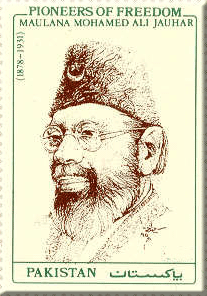 |
|||
 |
|||
 |
|||||||||||
 |
|||||||||||
|
A fiery orator, a forceful writer and fearless freedom fighter, Maulana Mohammed Ali Jauhar was credited with having the heart of Napoleon, the pen of McCauley and the tongue of Burke. For nearly two decades he strode the Indian political scene like a Colossus and had the unique distinction of having directed the affairs of the three most important political parties in the country -The Indian National Congress, the All India Muslim League and the Khilafat Movement. A devout Muslim and a staunch patriot, he fought both for India and for Islam. He gave his life for India and found a permanent resting place in a Muslim sanctuary. Born in Rampur on December 10, 1878, he was orphaned while still a baby. The credit for his education and upbringing goes to his great mother Abadi Bano Begum, popularly known as 'Bi-Amma'. He obtained his Bachelor's degree from Allahabad University obtaining First position and took an Honours degree in Modem History from Oxford. After spending four years in England he came back to India and joined service, first in Rampur and then in Baroda. While in the service of the Gaekwad, he decided to become a Journalist. He knew that in this venture he had to sacrifice all and to expect no material gain; he firmly closed his eyes to all temptations and left for Calcutta to start the 'Comrade' -"Cornrade of all and partisan of none" as he put it. The first issue came out on January 11, 1911. Born in abject poverty, the 'Comrade' took the journalistic world of India by storm. Later, he started the 'Hamdard' from Delhi and the "Muslim Outlook" from England and piloted 'Echo de I'Islam' in Paris. Mohamed Ali had participated in politics before coming to Calcutta but he now made it the focal point of his life instead of one facet of his many sided personality. Politics was a passion, not a pastime, and journalism a 'means' not an 'end'. His contributions to the various political movements in India from 1911 to 1931 are now a matter of history. His convictions were deep and his enthusiasm boundless. He inspired all by the fife that kindled in him. By his simplicity, sincerity and missionary zeal he reached the heart of the masses and captured them as no one had done before. He was only too ready to face the gallows for the sake of his Country and in 1921 he narrowly escaped it when he was tried for incitement to mutiny in the famous Khaliqdina Hall at Karachi. Undeterred by all obstacles, he continued the heroic fight for freedom in spite of his failing health. It was a tough fight but he never gave in. Although seriously ill he attended the Third Round Table Conference in 1930. Sitting in a chair he spoke in its Plenary Session: 'I want to go to my country. if I can go back with the substance of freedom in my hand; and if you do not give us freedom. you will have to give me a grave here' .The British Government did not give freedom to India, but Maulana Mohamed Ali won a grave in a free country .He died in London on January 4, 1931. The body was carried to Jerusalem and buried in the place of the Prophets. |
|||||||||||
|
Author: Zia-ur-Rahman Zabeeh
Ex. Director General, Pakistan Post, Islamabad
Artist:
Professor Saeed Akhter
National College of Arts, Lahore
Webmaster: Zahid Ikram
CEO CYBER CITY ONLINE
Please Contact
Webmaster
for Comments/ Suggestions Sponsored By:
CCOLCopyrights © 2001, CYBER CITY
ONLINE.
|
|||||||||||
 MAULANA MOHAMED ALl JAUHAR
MAULANA MOHAMED ALl JAUHAR